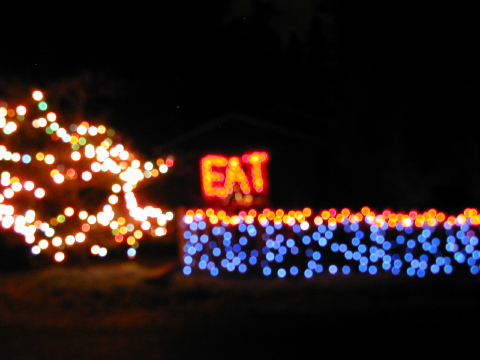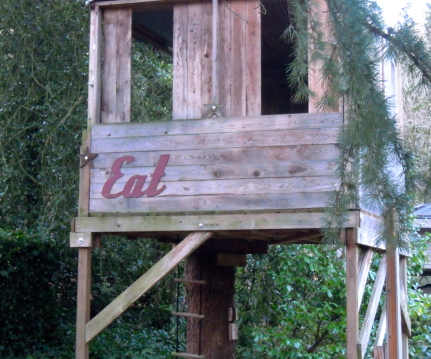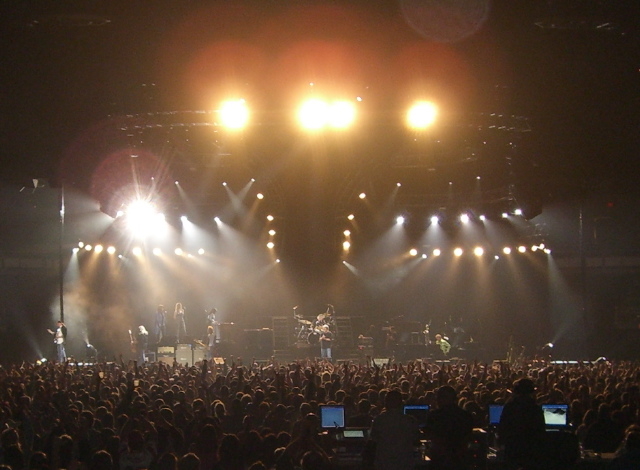Book Friday
Despite what you may have heard from various small-minded people in my past, I am not the one who ruined Christmas. But I do know how to save it.
First, about these vicious rumors, let me say that I’ve always been a stalwart supporter of Christmas and Hanukkah and any other holiday you might choose to celebrate this time of year. True, we usually order take-out on December 25, but from the good Chinese place, not the much cheaper but bad Chinese place we order from on other days. But if there’s no turkey on our dining room table during the holidays, it’s not because we hate Christmas. It’s because we have no dining room table—a situation related to the fact that we also have no dining room. That’s how we roll in Sucker Lake.
Possibly, you once had us over for dinner, and now several years or perhaps a couple decades later, you’re still wondering why we didn’t reciprocate. The answer’s simple. It’s because no matter how good a friend/cook/host you are, it’s not worth a $25,000+ addition to our house just to have a place to set a table we don’t own with china we don’t have and food we don’t know how to cook. Hey, maybe you’re one of the 3.2 million adults in the US between the ages of 18 and 54 who suffer from agoraphobia (thanks, Wikipedia!) and while you love giving dinner parties, you dread being invited to them. Check us out—we’re the perfect guests! Feed us, and you’ll never hear from us again.
So anyway, Christmas dinner here is out. Not happening. Ditto chestnuts roasting in the fireplace—we fear fire so much, we’re actually having our fireplace torn down, resale value be damned. Ixnay as well on gathering around the hearth, unless hearth has become a synonym for my laptop computer, in which case feel free to gather 'round as I watch The Walking Dead, if that’s what turns you on.
We also don’t do carols, send cards, or put reindeer in the yard, though if I could find a lifelike ceramic coyote chewing the leg off a lifelike reindeer, I’d be tempted, except for the possibility of attracting real coyotes. I’ve got enough tricksters in my life.
We do, however, put up lights. Every year, in festive three-foot-high letters, we spell out the word EAT on the front of our house. It is our cheery holiday message to the world.
.jpg)
Christmas in the '70s
______________________
This tradition dates back to the early 1970s, which coincidentally is also when the accusations about me spoiling Christmas began. (I say coincidentally because the complaints originated from my classmates on the high school paper who had never seen my Christmas lights. Several of these Goody Two-Shoe types—who were studying journalism, for chrissakes—were incensed over the free expression of ideas. Specifically, they were pissed because I had exacto-knifed the word “happy” out of the huge wreath graphic we were running on the front page and replaced it with the word “funky.” Believe it or not, some of my classmates were so whitebread, they had never heard the word before and thus had no idea what a “Funky New Year” might be. But they knew it meant something bad, since anything you don’t understand is pure evil, right? Suffice it to say, the year that followed was not filled with funk for these charming young puritans, though that was hardly my fault, and these many decades later, I still bristle at the charge, gravely presented to our faculty advisor, that I somehow ruined their Christmas.)
(True, I also had a color poster in my peachy that I liked to flash around showing a dead or dying Santa Clause in a muddy Vietnamese rice paddy. My funkless classmates found the image offensive. But that wasn’t me ruining Christmas. That was the Vietnam War was ruining Christmas. I just had a picture of it.)

Ruining Christmas for the newspaper staff.
But back to the lights. In case you were born too late and missed all the good stuff, in the ‘70s our outdoor lights were composed of these big freakin’ bulbs that, if you saw one today, would remind you of the shape and size of a butt plug. I say “you” and not “me” because I would never think that, especially around the holidays. But if you’re reading this blog—and we both know you are—it’s safe to say you harbor interests that are considerably less wholesome than, say, my former high school classmates. (Feel free to do your own comparative research on old time Christmas lights and anal sex toys at etsy and thisnext.)
Anyway, the bulbs were big, and each one used as much energy as a Prius. Another great thing about Christmases past is that we didn’t worry about energy back then. We had plenty, possibly because you and all your friends weren’t born yet. Not that I want to ruin your Christmas, but you’ve got a lot to account for, young people of the world.
This particular Christmas, I asked my parents if I could be in charge of putting up the lights, a job that was normally handled by my dad. My parents were already aware of signs of social rebelliousness in my teenage persona. Years earlier, as an 11-year-old, I had wanted to put up a yard sign that said: “Barry Goldwater: The fascist gun in the west.” I didn’t know what fascist meant at that young age, but I knew it had to be pure evil. (cf. “funky,” above.) My Ramparts-reading father was no Goldwater fan, but our neighbors probably were, so the answer was no. (Years later, I learned that my mother had argued yes, assuming I wouldn’t have had the follow-through to actually make such a sign. She was probably right.)
Naturally, when the 70s rolled around and the Vietnam War escalated, I began shaving a peace symbol in our front yard with the mower. Backstory: Saturdays in our house began at the insanely early hour of 10 a.m., when my father would enter my room unbidden and ask a) if I was ever getting up and b) if I had any plans for the day. The second query was a trick question. I was a teenager. It was the dawning of the Age of Aquarius. Ipso facto, I had no plans. No one I knew had plans. I didn’t start making plans, in fact, until Reagan’s second term, and then they involved paying off one credit card with another to avoid having to find a job and get up early. The consequence of this self-inflicted Ponzi scheme is that I went deeply in debt and was forced to become the employed person I am today; the consequence of having no plans on a Saturday in the 1970s was being force-pressed into mowing the lawn. I did so grudgingly, and when I was done I adjusted the blade to its lowest setting and mowed a gigantic peace symbol in the yard. We lived on a dead-end street, so my parents let it go. They also agreed with me. We Sparlings were liberals in a nest of conservatives.
So when I positioned my parents at the end of the driveway one night many years ago, after a cold afternoon of hammering and adjusting a string of butt-plug shaped lights, I knew they expected social commentary. Perhaps another peace symbol. Maybe something pithy like END THE WAR. Instead, what they got was EAT.

Christmas in the '90s.
EAT. It’s what you do over the holidays. More to the point, it’s what I was forced to do at holiday gatherings I didn’t wish to attend. According to the as-yet-unrecognized but nevertheless virulent reverse sexism and ageism of the day, I—a male and a teenager—was expected to eat a lot, whether I wanted to or not. Seconds were required. Thirds were expected. The implicit social contract was this: If you don’t ask for more food, it’s because you don’t love me. My grandmother never actually said this, but it was in the air. And in the squash and sweet potatoes. Also, she wasn’t really my grandmother. My appetite, my clip-on tie, the bloodline—all phony. Didn’t matter. You had to eat.
Shit. I live in a house with no dining room and I just now figured out why. (Thanks for nothing, assorted therapists.)
Anyway, my parents let me keep the lights up and we turned them on every evening. One night during dinner, a neighbor called. She lived two streets over but could see our lights across a couple vacant lots. Like all adults I knew back then, she was too polite to say what she really meant, but too artless to disguise it very well.
Did you know, she asked my mom, who had picked up the phone, that from here, through the trees and all, your Christmas lights almost look like they spell out the word EAT?
My goodness, my mom replied. Isn’t that something! No, she had no idea.
After she got off the phone, we spent the rest of the meal looking at our neighbors’ lights across the vacant lots and having polite, imaginary phone conversations with her. Did you know that, from here, your lights look like a horse’s ass? No? Isn’t that something!
______________________
Skip forward twenty-five years. My father, dead of Parkinson’s and depression. My mother, slowly recovering from a stroke. More than 2,000 miles between the family home in Michigan and Portland, Oregon, where my sister and I have relocated. Just the three of us were left, and my mom couldn’t live alone. We had to move her out here. She didn’t want to come.
And so it happened that, one December at the end of the century, with the Age of Aquarius long since dead and buried, I stood again at the end of a driveway with my mother. This time, here in Sucker Lake. Once again, I had a surprise for her. I gave the signal and my son turned on the lights. EAT, they said, albeit in smaller, more energy-efficient bulbs. I did it for her, a surprise for old time’s sake to help make her feel at home. She got a kick out of it. We all did. The next Christmas she passed away.
______________________
But the EAT sign continues. It’s a Sparling tradition now and I think it will last a long time. I live, once again, on a dead-end street, and to be honest, I haven’t gotten as many comments as I’d hoped. People are used to crazy shit these days. The only really good complaint I got came from an elderly neighbor who said, no lie, that I was ruining her Christmas. It was heartening, knowing someone was out there, paying attention. In the world of guerilla social commentary, it’s stuff like that that keeps ya’ going. Once and a while, for the sheer hell of it, I’ll throw the lights up on the Fourth of July to try to ruin Independence Day. EAT is my primal, elemental message to all who pass by. If I had a bigger house and more bulbs, I’d add, “for tomorrow we may DIE.” That would freak some people out.

The treehouse near Sucker Lake. You can never have too many EAT signs.
Yet the message is not really about food anymore. Never was. It’s about consumerism. Some of us liberals worried that Christmas was becoming a celebration of consumption way back in the ‘70s. Ha! What amateurs we were then, compared to the gargantuan maw of consumption that is Christmas today. The holidays might mean various things to you, but one thing they are indisputably and ferociously about is consumption. EAT equals CONSUME equals BUY.
Looked at that way, my sign isn’t outside the spirit of Christmas at all; to the contrary, it embodies the spirit of consumerism like no other word can.
______________________
So go on, go for it. On the day after Thanksgiving (and throughout the holiday season) go out and buy anything you want…just as long as it’s a book. That’s how we’re saving Christmas this year. Forget Black Friday. It’s Book Friday now.
And by go out, I mean to a physical bookstore with a real bookseller inside. From what I’ve heard, last Christmas was tough for some independent bookstores. Chances are, your favorite record store is already gone. If your favorite bookstore is still open, use the power of your holiday spending to help keep it that way. Go out on Book Friday and buy books for everyone.
Trust me, there’s no occasion when a book wouldn’t be better than the outrageous holiday crap you were planning to buy (like this thing.) Do you really need another holiday sweater/camera/butt plug? How about a book about said sweater/camera/butt plug? How about a book about books?
Or let’s say I invite you over to the house for a holiday dinner (which I won’t, but hypothetically). Don’t show up with a bottle of wine or flowers as your gift. Bring me a book.
Similarly, don’t give the parking lot guy 40 bucks in an envelope as recompense for only mildly dinging your car this year. Give him 40 bucks and a book.
You get the drill, right? Do not send flowers, candy, or fruit to distant relatives. Starbucks and iTunes cards are the mark of the devil. Find humans who don’t read, and give them novels and poetry. The gods will salute you. Rich people, instead of buying your hubby or wife a $50,000 SUV Hummer, buy him/her $50,000 worth of books. Don’t wrap them.
But which books, you wonder? Well, the one I wrote would be a fine choice. But so would any other. How about one of the National Book Award winners, or all of them? How about the equally fine or finer books unrecognized by awards? Perhaps you could find a website that recommends good books. There must be one somewhere.
They do have to be real books, however. With physical pages and covers. That’s what Book Friday is all about.
______________________
How many books should you buy on Book Friday? Simple. Just take the prime number closest to your hat size, multiple by the number of letters in your last name, and divide by the speed of a bus traveling from Baltimore to Poughkeepsie. Knowing you, that's probably three or four.
Also, I know you like sitting at your computer and sending money to far-away places, listening into the ether for the efficient whir of gears as robots robo-pack your purchases. That’s not gonna cut it this year. No sexy UPS guy with a package from Amazon is gonna get us out of the mess we’re in. The bottom line is this: Independent bookstores are good for our communities and good for America...and the world, come to think of it. Basically, if you don’t support your local booksellers, you’ll be ruining more than Christmas. You’ll be ruining the future. And you wouldn't want that rumor to get around.
So head out to your favorite bookstores on Book Friday, and stock up. I’ll be out there with you. Do it for the local economy, for the people you love, for me, for my mom, or for yourself.
And have a funky new year.
_________________________________________________

Alright, Detroit!! You feel funky tonight? I feel funky tonight: Bob Seger, "Trying to Live My Life Without You."
 Subscribe to the RSS feed
Subscribe to the RSS feed